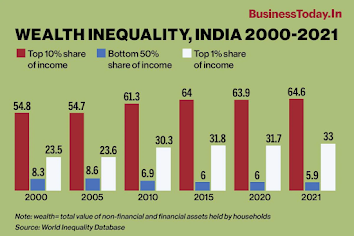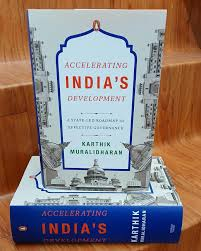What set me thinking about a welfare state is the problem of the disparity in wealth between the haves and have nots. While right from my childhood I have seen inequality and wealth disparity, the sheer magnitude of that is beyond my imagination. The phenomenon of this disparity and the flaunting of wealth has increased manifold after the 1991 economic reforms. A country which was governed by left leaning socialist welfare state agenda driven leadership was in a serious crisis. The foreign exchange reserves were at their lowest, the collapse of the Eastern bloc and huge negative trade deficit with the Western cutres led to a situation where India had to bow to the demands of IMF and World Bank and allow the protection barriers to Indian industry to be removed. After this date it almost seemed to me experientially that the flood gates had opened. Flaunting wealth became fashionable and splurging and spending wealth publicly became more and more commonplace. Perhaps residence of Mukesh Ambani located on Altamount Road has been touted as the most expensively priced rate in the world and the more recent events surrounding the pre-nuptials and the wedding of his son Anant Ambani made me feel it is time to investigate this inequality.
It has been rightly said that we live our lives and often trust God to see us through but the story and our decisions need to be backed by data. https://inequality.org/facts/global-inequality/ This site gives astounding statistics.
.png)
- The Richest 1.5% of the world population worth more than a million 1,000,000 US $ own 47.5% of the total wealth.
- The next rich 16.3% of the world population worth between 1,00,000 to 1,000,000 US $ own 39.4% the total wealth.
- The next middle income 42.7 % of the world population worth between 10,000 to 1,00,000 US $ own 12.6 % the total wealth.
- The last low middle income and poor 39.5 % of the world population worth less than 10,000 US $ own 0.5 % the total wealth.
So the scale of inequality is not astounding but it is monstrous and beyond the wildest imagination of anybody. Most of us reading this blog would be definitely 3 and a few in category and some maybe in category 4. So we are definitely better off than more than 40-60 % of the world and need to have no reason to complaint or whine.
Is the situation in India better, yes marginally.
- The top 1% of the population in 2021 owned 33% of the wealth up from 21.5% in 2000.
- The top 10% of the population in 2021 owned 64.6% of the wealth up from 54.8% in 2000.
- The bottom 50% of the population in 2021 owned 5.9% of the wealth down from 8.3% in 2000.
Even if the maths do not add up for me this is the stark reality as we see in our houses and among us persons who earn less in a year than what many of us can spend on ourselves in a week or so. A marginal rise in prices of food like tomatoes onions etc can play havoc in the lives of many.
The question which comes to my mind is that what has led to this? If there is a Government or state to regulate policy then why is this gap increasing rather than decreasing. It is true that those who create wealth also by their huge enterprises create prosperity and jobs for many. It is also true that while we say there is poverty and lack of jobs and work, a 15 week course for training caregivers for geriatric and Alzheimer's disease course which can give a guaranteed job earning at last Rs 15-20,000 per month for a 12 standard passed out person has no takers. So poverty may to some extent be self inflicted. The question is that can a democratic state tax the rich beyond the 30% it is already doing. As a medical professional is it fair that I get only 70% of what I earn ,so effectively the government takes away literally 3-4 months of my earning. Nothing seems fair, but something needs to be done.
A welfare state must provide basic amenities like food, shelter, healthcare, jobs and clean air, water and proper sanitation. As yet these things remain unattained and states over the years instead of concentrating efforts to reach this are abdicating this responsibility and spending precious resources on wars and falling into the trap of allowing oligarchs and crony capitalists to corner wealth at the cost of welfare. The 33 sustainable Development Goals adopted in 2015 with a promise to attain them in 2030. While experientially and based on data India is in a position to attain a few goals before 2030 particularly relating to reduction in poverty and neonatal mortality and immunization. it's dismal rank of 109 out of 166 nations means that we are far from the promised goal. This gap in wealth and abdication of responsibility by the state has been bridged by Non Governmental Organisations, Corporate Social Responsibility funds and individual donation campaign by people who care.

The great Mahatma Gandhi was constantly surrounded and supported by the rich and wealthy many of whom funded his campaigns. Rich industrialists including Sir Ratan Tata, G D Birla, Jamnalal Bajaj, Ambalal Sarabhai and many individual rch persons gave their wealth for the noble cause of attaining freedom. Were these donations anonymous? Was any favour likely to be given by Gandhi to these donors? The answer is a resounding negative. Gandhi raised funds for a cause using his sheer volume of work and example of selfless action subsuming selfish desires that create attachment.
Communist state vs Capitalistic State
The other socialist route was one where state took ownership of private wealth to redistribute it and give the poor their due. The ownership of the means of production was with the state and individuals have to give up everything for the so called greater common good. In such a situation individual enterprise and desire to improve and become better is stifled as there was no reward for bettering the life of the individual nor society. So avoidance of work and doing nothing was the preferred way of life in a communist society. Even so decadence and corruption by the authorities of states led to creation of a coercive regime which violently crushed individual freedoms and ensured that there were no free markets and competition and the people were forced to live lives of scarcity and were not allowed the rights which democracies gave individuals.
In 1989, the fall of the Berlin wall and in 1991 the perestoika movement and collapse of the Soviet Union ensured that Capitalism and democracies however, flawed had decisively won the war of ideology. So it seemed but today the Trumps, Putins, Modis, Nethanayus, Eragodan and many such leaders are eroding democracies while maintaining the facade of electoral politics. Therefore the states are becoming tools in the hands of Multinational companies, oligarchs and rich companies which control data and media.
Is there an alternative? Yes it was proposed by J C Kumarappa in his enunciation of the concept of Trusteeship and Economy of Permanence. While it may seem esoteric and impractical, at least understanding the key elements will make a case for a welfare state which is the topic of this blog.
- Transience vs Permanence: Here the dependence on fossil fuels, a limited scarce resource is already creating climate changes and therefore that all human beings must pursue the path of harmonious existence with least ecological damage and designs which do not disturb the balance of nature. Are the rich ready to bear the cost without making the poor pay for it?
- While Gandhi said that there is a balance between need and greed and while there is enough for every mans need but not enough for even one persons greed. Greedy consumption is a kind of violence an exploitation of nature, labor and other nations as seen in colonialism of that time and MNC domination today.
- Gandhian economics believed in local consumption and self sufficiency of small local units rather than mass factory production by cheap exploited labor with transportation making a larger carbon footprint. A demand for Kiwi fruit in India is greed not need, but Kiwi grown in India is Ok.
- Concept of Trusteeship as embodied in wealth created by the rich to be held and utilized to benefit society and the poor. The examples of the Tata group of companies where 66% of the wealth is owned by trust and this remains so and can never be changed. This is way above 2% of profit of CSR mandated by Government of India.
- Simple living does not mean frugal but appropriate wealth and consumption which does not tip the ecological balance. It is hard to define enough but for my gentle readers. Comfortable houses, 600 sq. feet, adequate food, clothing, educatio, water sanitation, electricity and WiFi are needed in modern times.
Conclusion: Has a welfare state as it existed in India delivered on its promise of poverty reduction and socio-economic equality? The answer is probably not but while market dominated economics has lifted millions of individuals from destitution and poverty, it has also widened the gap of financial inequality. So we must ensure that basic income is pushed into the pockets of the poor as the prerequisite for human development of any kind. Innovation, creativity, research and even fine arts, culture, performing arts is not possible on an empty stomach. It is noticed that Scandinavia countries which ensure that the Government does not abdicate its responsibility to give free food, education, water, electricity, Wi Fi and connectivity which is also becoming a necessity fare better on the index of happiness. So should this be India's model of development? A consumption tax rather than income tax maybe a solution. Ethical behaviour based on the laws of Dharma will help procure better outcomes in terms of pursuing wealth, pleasure and lead to true happiness.
The mechanisms of equal, equitable wealth creation can be done by digitization and clear parameters measured using weighted criteria and ensuring accurate data flows and increased state efficiency. Incentives for increasing and augmenting state capacity by targeted investments will give better outcomes than doling benefits. The overhaul of education system based head, hearts and hand will lead to far more positive outcomes than mere electoral sops. I think the book Accelerating India's growth gives the way forward. This is because practical incremental solutions are needed. I am convinced that it is obligation to the world and to those who are poor to provide a social security and by paying for it w the rich are not doig anybody a favour because our welfare is linked to the welfare of our brethren and this extends to our fellow humans and creatures of the earth.
Vispi Jokhi
.png)






Comments